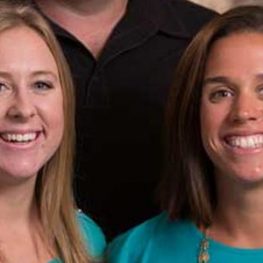 When the U.S. Food and Drug Administration decides whether or not to approve the marketing of an experimental therapy, it’s reasonable to expect a dispassionate weighing of the evidence and a determination of the risks versus the rewards of a drug.
When the U.S. Food and Drug Administration decides whether or not to approve the marketing of an experimental therapy, it’s reasonable to expect a dispassionate weighing of the evidence and a determination of the risks versus the rewards of a drug.
Rare disease advocates, though, may be frustrated when decisions don’t go as they hoped. To address the issue, a group of rare disease advocates have gotten two Congressional representatives to sponsor the Helping Experts Accelerate Rare Treatments, or HEART, Act, legislation designed to ensure that rare disease experts are involved in every stages of the review process for new drugs.

Photo: Lindsey Sutton and Melissa Goetz, co-founders of
Though it might be easy to dismiss the disappointments rare disease patients feel when a drug they believe offers hope of treating a condition fails to win regulatory approval, rather than being a case of emotions outweighing reason, it may be a matter of perspective. Consider pancreatitis, something Lindsey Sutton knows about.
When Sutton was five months old, she was diagnosed with familial chylomicronemia syndrome (FCS), a rare genetic disease in which people lack an enzyme needed to breakdown fat in the blood. One of the consequences of the condition is that it can cause sudden, severe, and recurrent pancreatitis that can potentially be fatal.
“There’s no warning. Typically, it just hits. I cannot tell you how many times I’ve gotten up in the morning, do my morning routine. I’m totally fine and ready to take on the day, and then out of nowhere, I feel this intense pain start in the center of my abdomen and it feels like something is just eating the inside of my abdomen and it goes up to my upper left quadrant,” said Sutton, who is co-founder of the FCS Foundation. “It feels like someone’s taking rebar and twisting it into your scapula. It’s hard to walk. Um, then there’s vomiting, diarrhea and confusion.”
These attacks result in Sutton spending about a week in the hospital on pain medication and IV fluids with nothing eaten for several days and then moving to clear liquids until triglycerides and other measures drop.
“That’s just for like your typical pancreatitis attack,” said Sutton, who noted that at one point, her attacks were occurring about every eight weeks. “There’s necrotizing pancreatitis, which I’ve also had, and that was an ICU case, and which many of our patients have had, where the pancreas starts digesting itself. That is incredibly scary and life threatening.”
The FDA in August 2018 notified Akcea Therapeutics and Ionis Pharmaceuticals that it would not approve the companies’ application to market Waylivra as a treatment for FCS without additional data.
The agency was concerned about the drug’s potential to lower the platelet count of patients. One member of the FDA advisory committee that looked at the data suggested that patients would be trading one disease (FCS) for another (thrombocytopenia). The agency also seemed to have concerns that the use of a surrogate endpoint may not have provided convincing enough evidence of efficacy to offset the safety concerns.
As Sutton and her FCS Foundation Co-Founder Melissa Goetz discussed the issue with other rare disease advocates, they heard similar concerns that review committee reviewers didn’t have enough of a rare disease perspective to understand the risk and reward balance as a rare disease patient would.
“It is absolutely essential that the process we use to review and approve drugs for rare diseases in the United States reflects the unique issues that apply to these diseases, which are often not well known or understood by regulators and even by clinicians,” said Goetz, who has a child with the condition. “We may not be experts in the regulatory process, but we are experts in our own rare conditions with important and helpful information to share.”
The FDA previously held a voice of the patient meeting on FCS and during the advisory committee process several FCS patients and parents of patients spoke about the condition. Nevertheless, Goetz said more needs to be done to assure the rare disease perspective is incorporated into the regulatory review process.
At the urging of the FCS Foundation and others, Congressmen Paul Tonko (D-New York) and David McKinley (R-West Virginia), introduced the HEART, Act to alter the review and approval process for drugs to treat rare and ultra-rare diseases.
In addition to requiring the agency to include members of its own Rare Disease program staff in reviews for drugs to treat rare diseases, the FDA must include experts in rare diseases on Advisory Committee panels for rare disease drugs.
The legislation would also require the FDA to prepare an annual report showing how many rare disease drug applications were reviewed by each division at the Agency.
Members of the patient community would also need to be consulted when devising or reviewing a Risk Evaluation and Mitigation Strategy (REMS) for a rare disease drug that calls for patient participation. And the General Accounting Office would be required to review the EU process for approval of rare disease drugs, including use of data from open label extension studies of relevance to the FDA.
The legislation has the support of the Haystack Project, a coalition of rare disease stakeholders. Other groups have not yet endorsed the legislation, but the FCS Foundation is talking to other advocates to build support among patient advocacy organizations.

Stay Connected
Sign up for updates straight to your inbox.
